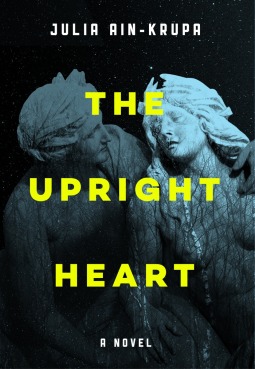The Upright Heart chronicles the return from Brooklyn of a Jewish man, Wolf, to his native Poland soon after World War II. He is haunted by the memory of his Catholic lover, Olga, whom he abandoned to marry a woman of his own faith and start a new life in America, and who perished sheltering the parents and younger sister he left behind. Harassed on the streets of postwar Poland, Wolf is watched over by the spirits of those who died during and after the war but have yet to let go. His story is woven together with those of others, living and dead, Catholic and Jew, including the deceased students of a school for girls, a battalion of fallen German soldiers, and an orphan boy who wanders the streets of Krakow, believing in a magic pill he has conjured up as a way to survive.
Reviewing has made me familiar with several outstanding examples of Holocaust literature and how magic realism can throw light on the subject. This book therefore was not as much as a surprise for me as it might be for others. But for most readers its approach will be new and very different to that of much of the Holocaust literature one sees on bookstore shelves.
I receive this book free from the publisher in return for a fair review.
Goodreads description
The war is over, but the suffering is not. Not for the living, nor for the dead. Dead and living exist in a state of limbo, all trying to move on. The living with their lives and the dead from the world they now inhabit as ghosts.
Julia Ain-Krupa weaves a lyrical, dreamlike novel of intermeshed stories. The narrative shifts from one point of view to another and from first to third-person voices. Often the point of view is not easy to identify immediately and the reader must rely on picking up clues. This can be distracting, but it is usually best to go with the flow and not worry about it. The disorienting effect is probably deliberate, reflecting as it does the circles of limbo in which the characters exist. The story does move forward, even if at times this is not apparent. And for most of the characters there is a resolution of some kind by the end of the novel.
This is not an easy book to read and not every reader will enjoy it. First there is the bleakness of the subject matter - Holocaust literature isn't for everyone. And secondly there is the style.
I have read and reviewed several magic-realist novels that deal with the Holocaust. Most recently there was In the Land of Armadillos by Helen Maryless Shapiro. You will find an interesting insight into Magic Realism and the Holocaust on Helen's blog here. I must say I preferred Helen's approach to the Holocaust to Julia Ain-Krupa's. Stylistically The Upright Heart is similar to that of A Kingdom of Souls by Daniela Hodrová, which likewise presents a world in which the dead exist alongside the living. It is interesting to note the similarity in cover design. However Hodrova's novel is grounded in a place (a house overlooking a cemetery in Prague), which gives it a framework that The Upright Heart lacks.
I have read and reviewed several magic-realist novels that deal with the Holocaust. Most recently there was In the Land of Armadillos by Helen Maryless Shapiro. You will find an interesting insight into Magic Realism and the Holocaust on Helen's blog here. I must say I preferred Helen's approach to the Holocaust to Julia Ain-Krupa's. Stylistically The Upright Heart is similar to that of A Kingdom of Souls by Daniela Hodrová, which likewise presents a world in which the dead exist alongside the living. It is interesting to note the similarity in cover design. However Hodrova's novel is grounded in a place (a house overlooking a cemetery in Prague), which gives it a framework that The Upright Heart lacks.
Reviewing has made me familiar with several outstanding examples of Holocaust literature and how magic realism can throw light on the subject. This book therefore was not as much as a surprise for me as it might be for others. But for most readers its approach will be new and very different to that of much of the Holocaust literature one sees on bookstore shelves.
I receive this book free from the publisher in return for a fair review.

No comments:
Post a Comment